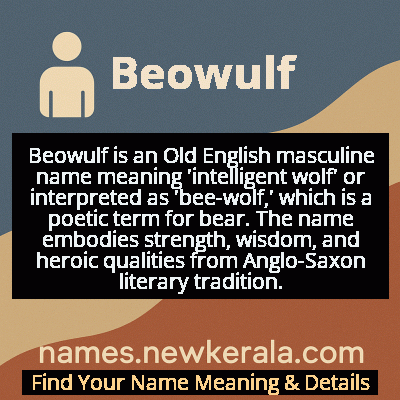Beowulf Name Meaning & Details
Origin, Popularity, Numerology Analysis & Name Meaning of Beowulf
Discover the origin, meaning, and cultural significance of the name BEOWULF. Delve into its historical roots and explore the lasting impact it has had on communities and traditions.
Name
Beowulf
Gender
Male
Origin
Anglo
Lucky Number
3
Meaning of the Name - Beowulf
Beowulf is an Old English masculine name meaning 'intelligent wolf' or interpreted as 'bee-wolf,' which is a poetic term for bear. The name embodies strength, wisdom, and heroic qualities from Anglo-Saxon literary tradition.
Beowulf - Complete Numerology Analysis
Your Numerology Number
Based on Pythagorean Numerology System
Ruling Planet
Jupiter
Positive Nature
Optimistic, inspirational, and creative.
Negative Traits
Scattered, exaggerating.
Lucky Colours
Yellow, gold, purple.
Lucky Days
Thursday.
Lucky Stones
Yellow sapphire.
Harmony Numbers
1, 2, 9.
Best Suited Professions
Arts, writing, communication.
What People Like About You
Creativity, optimism.
Famous People Named Beowulf
Beowulf
Legendary Hero
Protagonist of the Old English epic poem, defeated monsters Grendel, Grendel's mother, and a dragon
Beowulf Boritt
Set Designer
Won 2014 Tony Award for Best Scenic Design for 'Act One'
Beowulf Sheehan
Photographer
Renowned literary portrait photographer who has captured images of over 2,000 authors
Name Variations & International Equivalents
Click on blue names to explore their detailed meanings. Gray names with will be available soon.
Cultural & Historical Significance
The name's cultural impact extends far beyond its medieval origins, becoming a symbol of English literary heritage and the archetypal monster-slayer in Western literature. Beowulf represents the transition from oral tradition to written literature in English culture and has influenced countless subsequent works of fantasy and heroic literature. The character's three great battles against supernatural foes have become foundational templates for the hero's journey narrative structure, making Beowulf not just a character but a cultural touchstone for understanding early English society, values, and storytelling traditions.
Extended Personality Analysis
Individuals named Beowulf are typically perceived as possessing exceptional courage, physical strength, and unwavering determination. They embody the classic heroic virtues of loyalty, honor, and protective instincts, often taking on leadership roles naturally and demonstrating remarkable resilience in the face of adversity. Like their legendary namesake, they tend to be problem-solvers who confront challenges head-on, showing both strategic intelligence and raw physical capability when necessary. Their personality often combines traditional masculine virtues with a deep sense of responsibility toward their community or family.
Beyond the obvious heroic qualities, those named Beowulf often display a complex blend of confidence and humility, understanding their own capabilities while remaining grounded. They typically possess strong moral compasses and are driven by a sense of duty rather than personal glory. The name suggests someone who is both physically imposing and intellectually sharp, capable of both decisive action and thoughtful consideration. Their leadership style tends to be earned through demonstrated competence rather than demanded through authority, and they often inspire loyalty and respect through their consistent reliability and protective nature.
Modern Usage & Popularity
In contemporary times, Beowulf remains an uncommon but culturally significant given name, primarily used by parents seeking a distinctive name with deep literary and historical roots. Its usage peaked in the late 20th and early 21st centuries, particularly among families with interest in medieval literature, Anglo-Saxon heritage, or unique mythological names. The name maintains a niche popularity in English-speaking countries, especially the United Kingdom and United States, where it's often chosen by academics, literature enthusiasts, and parents looking for a strong, masculine name that stands out from more common choices. While never reaching mainstream popularity charts, Beowulf has seen increased visibility through film adaptations and cultural references, making it more recognizable to modern audiences while retaining its distinctive character.
Symbolic & Spiritual Meanings
Symbolically, Beowulf represents the eternal struggle between civilization and chaos, humanity and monstrosity, order and destruction. The name embodies the archetype of the culture hero who defends society against existential threats, making it symbolic of protection, guardianship, and the triumph of human courage over seemingly insurmountable odds. As 'bee-wolf' (a kenning for bear), it carries connotations of wild strength tempered by intelligence, representing the balance between primal power and civilized virtue. The name also symbolizes the enduring power of storytelling and cultural memory, serving as a bridge between ancient oral traditions and modern literary consciousness.
Metaphorically, Beowulf has come to represent anyone who confronts and overcomes great challenges through a combination of physical prowess, strategic thinking, and moral courage. The name suggests someone who faces their 'Grendels' - whether personal demons, professional obstacles, or societal problems - with unwavering resolve. It symbolizes the idea that true heroism involves not just physical strength but also wisdom, loyalty, and the willingness to sacrifice for the greater good. In modern contexts, the name has been adopted in computing (Beowulf clusters) to symbolize powerful, coordinated systems working together, extending its symbolic meaning into the technological realm.

